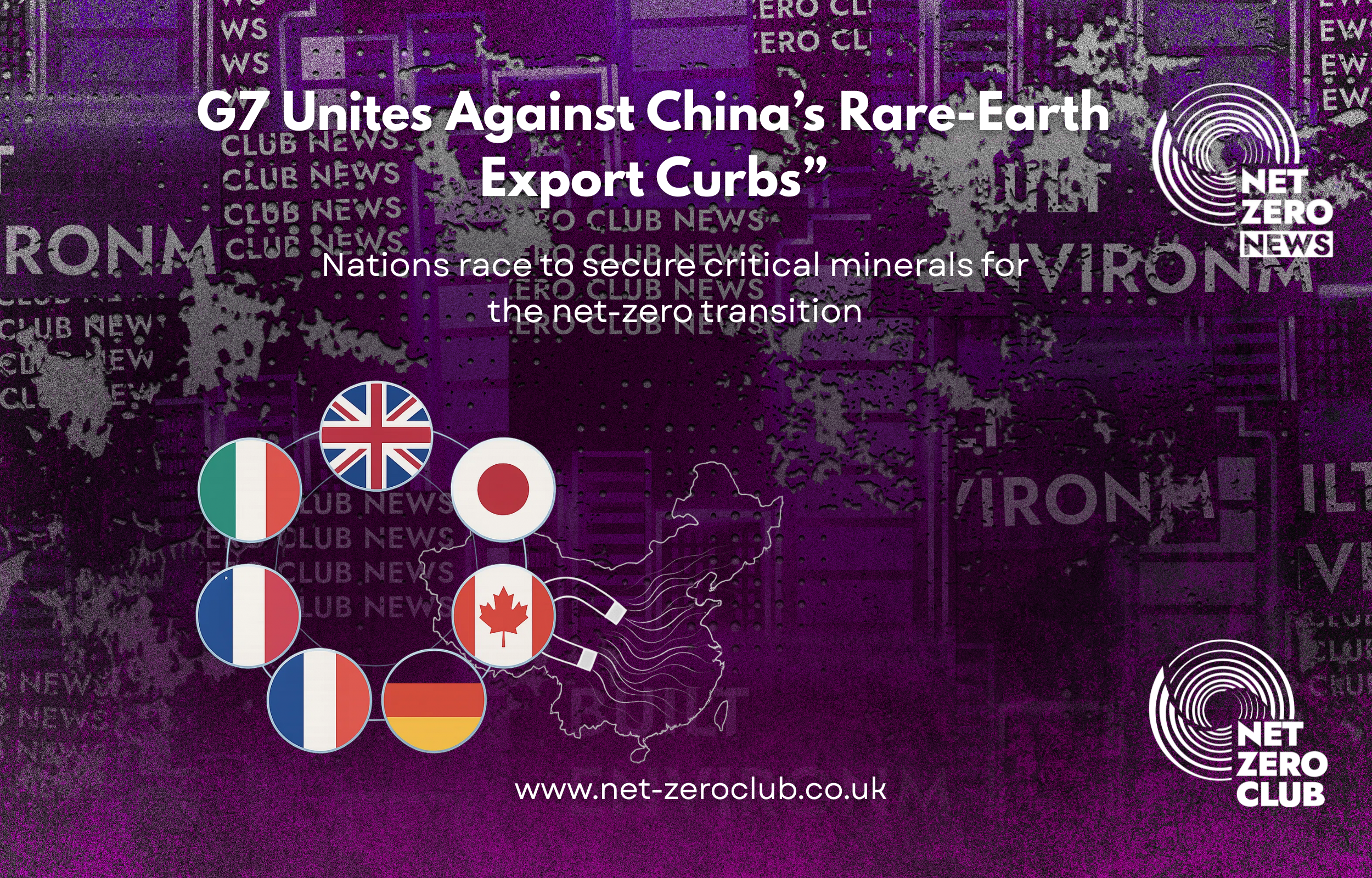G7 Takes Action Against China’s Rare-Earth Export Restrictions

Hello, Champions of Net Zero!
As the global community continues to grapple with the urgent need for sustainable energy sources, a significant geopolitical tension is unfolding that could impact the green transition. The recent escalation of China’s export restrictions on rare-earth minerals is causing a ripple effect across the G7 nations, prompting a race to establish a unified response. This critical situation underscores the intricate relationship between geopolitics and the green economy, highlighting the ongoing challenges of supply chain security for essential technologies.
At the heart of this unfolding drama is China’s recent announcement of new export controls on rare-earth magnets and the refined metals and alloys necessary for their production. These materials are vital not only for the burgeoning electric vehicle market but also for advanced technologies used in military applications, including F-35 fighter jets and naval vessels. As it currently stands, China dominates the rare-earth sector, responsible for approximately 60% of global mining and a staggering 90% of processing. This monopoly has raised alarms within the G7, as nations scramble to secure their supply chains and reduce dependence on Beijing.
In light of these developments, the United Kingdom, Canada, and the European Union are actively considering a coordinated response at the upcoming G7 ministers’ meeting scheduled for the end of October in Toronto. Canadian Energy and Natural Resources Minister Tim Hodgson has emphasised the urgency of the situation, stating that G7 nations are “putting our shoulders to the task” to explore alternatives and mitigate the risks posed by China’s actions.
The G7 allies are not merely reacting to the restrictions; they are proactively working towards a multilateral approach to safeguard their interests in critical minerals. This includes accelerating stockpiling measures, activating partnerships for critical mineral sourcing, and expanding mining activities in a more collaborative manner. According to Hodgson, the G7 is in discussions about concrete steps to enhance supply security, with expectations of announcements during the Toronto meeting.
EU trade chief Maroš Šefčovič has also called for a unified response among G7 nations, indicating that he will be discussing these issues directly with Chinese Commerce Minister Wang Wentao. The European Commission is keen on fostering coordinated measures against China’s export restrictions, with plans to launch a study assessing the impact of these new bans on the EU’s industrial landscape.
One EU official described China’s actions as “coercion,” highlighting the potential implications for global supply chains. The urgency is palpable as nations begin to recognise the risks of over-reliance on a single source for critical minerals. This situation mirrors past tensions, such as the trade disputes initiated by former President Donald Trump, who threatened to impose tariffs on China in response to similar actions. While the intensity of those confrontations has diminished, the lesson remains clear: dependency on China for rare earths poses significant risks.
During a recent meeting in London, Hodgson and his counterparts from various G7 nations discussed strategies to counteract China’s tightening grip on critical minerals. The upcoming meeting in Toronto will see leaders from the U.S., Japan, Italy, Germany, the U.K., and France convening to explore the potential of international cooperation in mineral supply chains. Hodgson reiterated the importance of leveraging financial tools to increase global supplies of critical minerals, citing stockpiling agreements and off-take contracts as essential components of this strategy.
Moreover, the geopolitical landscape surrounding critical minerals is rapidly evolving. The U.K. has renewed trade discussions with Greenland, aiming to secure a stable supply of these essential materials. Similarly, British Labour leader Keir Starmer and Indian Prime Minister Narendra Modi have committed to collaborating on downstream processing and research initiatives to diversify critical mineral supply chains.
In the face of these challenges, Hodgson advocates for multilateralism as a means to counteract non-market activities by certain states. He firmly believes that utilising trade as a tool for state manipulation is detrimental to global interests. As the G7 prepares for its meeting in Toronto, the urgency to address these critical issues has never been more apparent.
As we move forward, the interplay between geopolitics and sustainable energy initiatives will undoubtedly shape the future of global supply chains. The actions taken by G7 nations in response to China’s export curbs will not only determine the trajectory of their own energy transitions but also influence the broader global commitment to achieving net-zero emissions.
In conclusion, the situation surrounding China’s rare-earth export restrictions serves as a stark reminder of the complexities inherent in the pursuit of a sustainable future. As nations seek to diversify their supply chains and reduce dependency on a single source, the coming weeks will be pivotal in defining the G7’s collective response and, ultimately, the global approach to critical minerals in the green economy.
Stay tuned for further updates as we monitor the developments leading up to the G7 meeting and the subsequent actions taken by the international community. Together, we can champion the cause of net-zero emissions and work towards a sustainable future for generations to come.

 Got net-zero news, project updates, or product launches to share?
Got net-zero news, project updates, or product launches to share? 
